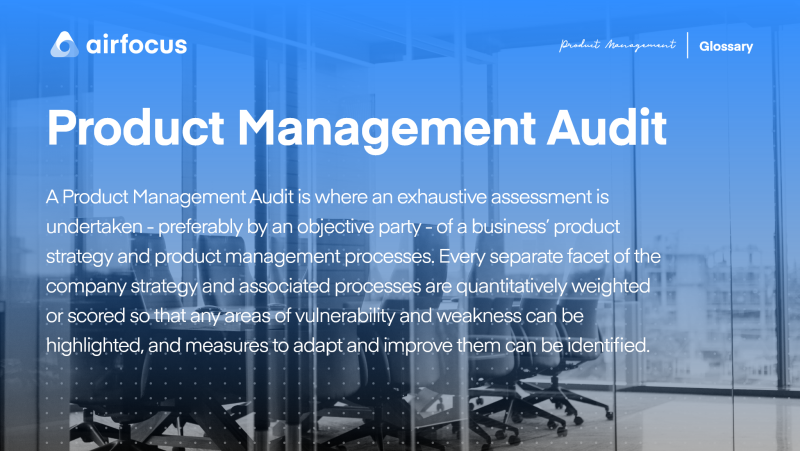Product Management Audit
What is a Product Management Audit?
Definition of a Product Management Audit
A Product Management Audit is where an exhaustive assessment is undertaken - preferably by an objective party - of a business’ product strategy and product management processes. Every separate facet of the company strategy and associated processes are quantitatively weighted or scored so that any areas of vulnerability and weakness can be highlighted, and measures to adapt and improve them can be identified.
Further still, an audit may also establish wholesale gaps in a strategy or process. By applying a scoring system, any changes or enhancements can be logged over time, measured, and effectively supervised.
It is possible for an audit to be viewed as an intrusive or even disruptive operation. Indeed, an effective audit should be seen as an opportunity for everyone to collaborate toward making fundamental improvements both to the processes for creating the product, and also the end product itself.
Who Should Conduct a Product Management Audit?
Although a business can undertake the audit internally, it is common practice to allocate the work to an outside organization that will contain autonomous experts and specialists. This has some obvious advantages.
Firstly, employing an external third party is a better way to ensure impartial measurement and analysis. An external group will not be subject to any politics, agendas, conflicts of interest, or market pressures, that can be inherent within the product’s business.
Furthermore, experts and specialists will be able to bring their knowledge and expertise to bear and will be able to conduct an assessment that can be benchmarked against other preceding audits.
These specialists will also be able to incorporate best practices into their work. Finally, the audit can be delivered in in-depth reporting and summary presentations. It should also be acknowledged that cost will play a part in external audit allocations since they tend to be more expensive.
They may also be more time consuming and lack corporate understanding in some areas.
External specialists need to be given full authority and support when conducting their assessment. In return, the business can expect total impartiality, professionalism, and authentic feedback.
What is the Objective of a Product Management Audit?
The desired outcome of a Project Management Audit is to gain a fundamental understanding of how the business is faring.
There are specific areas by which the organization is typically scrutinized: its grasp of the intended market of the product or service, how the organization caters to the needs of the consumer, and how the organization generates product requirements. It is noteworthy to point out that an institutional mindset of presumption can emerge if a company is thriving in a niche marketplace.
It might automatically assume it is meeting all the needs of its consumers, or be casually accepting it has a comprehensive understanding of its target market. This can be fertile ground for executing an audit.
The overarching premise of the audit is to assess the above three areas and assign a measurable score to them.
Using statistical methods and conducting quantitative analyses, the audit will be able to determine anomalies within department operations. These anomalies may well be obscure or unintuitive and therefore easily overlooked. Even small irregularities can have a large and long-lasting impact on a business’ commercial wellbeing.
Upon the close of a Product Management Audit, an organization will have established areas in need of improvement, what processes need to be implemented in order to achieve those improvements, any documentation or infrastructure that might be missing, and how well business operations are aligned with the organization’s overarching strategy.
The Audit Process
A significant aspect of the audit process is that it should include more than just the product management team. While they should remain at the heart of the process, the audit should, where appropriate, engage any parties that have a stake in the product or the business strategy.
Agreement At the outset, all stakeholders should be brought together with the auditors so that an agreement can be laid down as to the objectives of the audit and encourage discourse around the authority and access the auditors will require. Within this too, there should be discussions about what is expected of the organization’s staff. It is perhaps key at this early stage to emphasize how the thrust of the audit is to promote improvement, foster innovation, and not to criticize or condemn.
Materials Next, all relevant materials should be provided to the auditor - access to documentation and tools - that relate to the processes of product development and management. This enables the auditor to make assessments about what apparatus is in place, and also what might be lacking.
Interviews A useful practice is for the auditor to undertake interviews with pivotal members of staff. Typically, these sessions will be in a one-on-one format and will attempt to elicit honest and insightful feedback from each interviewee. The auditor will want to go into considerable detail and as a result, some interviews can be lengthy depending on the subject matter and the significance of the staff member’s role. More generically, an interviewer will also normally ask interviewees parallel questions as well as role-orientated ones. By doing this, the auditor can make determinations about perceptions of the effectiveness of processes and procedures. This can also include wider online questionnaires.
Conclusions Ordinarily, the auditor will then compile a report of all of their conclusions. This might either be disseminated as an in-depth analysis or an overarching summary. It is in this material the auditor will normally include a numerical weighting to the different parts of the organization’s product management process. Here, the auditor will be able to render conclusions around weaknesses, vulnerabilities, and possible solutions.
Workshops The organization’s leadership at this stage may also consider introducing workshops. This is so that stakeholders can assess the findings of the audit. Actions can then be agreed on and tasks assigned to relevant personnel. Even the question about the timing of the next audit can be addressed. It is largely at this point the auditor steps away from the business and the hard work of the organization should begin.

General FAQ

Glossary categories
Experience the new way of doing product management

Experience the new way of doing product management








